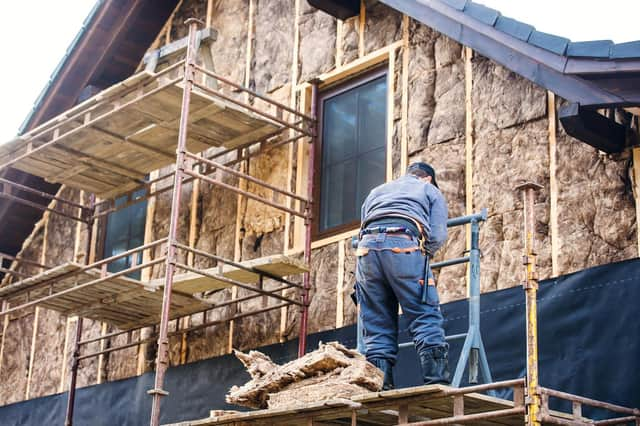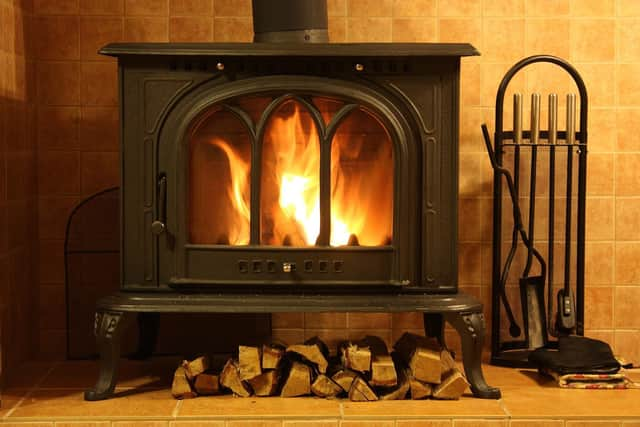Going Green: Finding ways to help reduce skyrocketing power bills headache


Green campaigner and consumer expert, Angela Terry, separates climate change facts from fiction and explains how you can take simple, practical steps to help save the planet. Follow @ouronehome & visit https://onehome.org.uk/ for more advice.
Q: I hear my gas bill could sky rocket.
What can I do to reduce it, other than turning off the heating?


A: Soaring gas prices have dominated recent headlines.
Advertisement
Hide AdAdvertisement
Hide AdSadly, the exorbitant bills that are driving the cost-of-living crisis could last for two years – according to Centrica, the UK’s biggest energy supplier.
Here are three things you can do to make your home more efficient ...
Check for leaks


The UK has the oldest and leakiest housing stock in Western Europe.
Less than two per cent of our homes score in the top energy efficiency rankings.
This pushes up bills and emissions.
Find out where heat is escaping from your home.


Advertisement
Hide AdAdvertisement
Hide AdThere are companies that can do this for you, using thermal imaging equipment. Surveys start at around £100.
For a DIY approach, on a windy day you could check around windows and doors for draughts, blocking any gaps with self-adhesive foam strips.
Insulate
Insulation is the most effective way of reducing your heating bills, according to the Energy Efficiency Infrastructure Group, a coalition of businesses and charities.
Better insulation could save the average household more than £500 per year.
Insulate your property as much as possible.
Your roof is especially important.
Advertisement
Hide AdAdvertisement
Hide AdHeat rises, which means around a quarter of all home heat loss is out the top. Make sure your loft insulation is at least 30cm thick.
Wall insulation is also a great energy saver. Cavity wall insulation involves injecting foam or beads into the gap between the inner wall and outer brickwork.
It comes with a 25-year guarantee. Older properties, built before 1920, may have solid walls. The best strategy is to wait until you’re redecorating anyway and fit insulation boards to the insides of your home’s outer walls.
Investigate grants
There are a range of government grants to help with domestic energy efficiency. They are targeted at those who receive benefits or are on very low incomes, so only apply to about a third of households.
Advertisement
Hide AdAdvertisement
Hide AdTo find out if you’re eligible, the Ofgem website has a helpful summary. Find more info on Simple Energy Advice and Energy Saving Trust websites.
For those in Scotland, Home Energy Scotland is on 0808 808 2282. Northern Ireland Energy Advice is on 0800 111 4455.
If you’re in receipt of benefits, you can ask your energy supplier about your eligibility for support through the Energy Company Obligation.
It requires medium and large energy suppliers to fund the installation of energy efficiency measures – including boiler repairs and installations, as well as loft, cavity wall and solid wall insulation.
Celebrity spot
Advertisement
Hide AdAdvertisement
Hide AdPop star Ed Sheeran (photo: Anthony Devlin/Getty Images) is putting his millions to good use with plans to rewild as much of the UK as he can.
The Shape of You singer recently told the BBC that he intends to buy lots of land, so he can plant trees.
His aim is to compensate for the large carbon footprint that is caused by his job, especially when it comes to touring.
The nature lover also revealed that he has a beehive, a wildlife pond and a wildflower meadow on his country estate in Suffolk.
Green swap
Advertisement
Hide AdAdvertisement
Hide AdWhite vinegar and a few drops of lavender oil works just as well as fabric conditioner (photo: stock.adobe.com) in washing machine drawer. Unlike shop-bought fabric softeners, this alternative won’t pollute the water course or make clothes more flammable.
Wood burning stoves and the environment
On a chilly day, many of us aspire to cosy up to a wood burning stove, mug of cocoa or glass of red wine in hand.
Sadly, they are increasingly controversial and many campaigners consider them an environmental no-no.
Here’s why ...
Air Pollution
Domestic wood burning has become the UK’s single biggest source of small particle air pollution, producing three times more than road traffic, according to government data.
Advertisement
Hide AdAdvertisement
Hide AdWhen you consider that only eight per cent of the population burns wood – that’s a lot of pollution from a relatively small number of homes.
Health Hazard
Air pollution is the biggest environmental risk to UK public health, according to the Department for the Environment, Food and Rural Affairs – making wood burning stoves a health hazard.
If you have someone with asthma in your family, you should certainly try to avoid using one.
Indeed, both Asthma UK and the British Lung Foundation have warned against them.
Advertisement
Hide AdAdvertisement
Hide AdBurning wood gives off tiny particles that can get into the airways.
Some of these toxins may enter the bloodstream and be transported around the body, lodging in the heart, brain and other organs – causing serious health problems.
Breathing them in can also inflame your airways.
Children, whose lungs are still developing, are particularly vulnerable.
Last Resort
With energy bills so high, it’s understandable that you might consider using your wood burning stove as an extra source of heating.
Advertisement
Hide AdAdvertisement
Hide AdWhile they are more eco-friendly than open fires, please only do this as a very last resort – and only with one of the latest, most efficient stoves, using dry wood.
Restrictions came into place in May last year on burning wet wood or coal and they should definitely be avoided as fuels.
Wet wood hasn’t been seasoned and so causes higher levels of pollution.
And please don’t burn wood that’s been painted or treated, as it could cause fumes that are harmful to your health.
Advertisement
Hide AdAdvertisement
Hide AdFinally, if you live in a town or in a city or a community with air quality issues, it is best to avoid lighting a wood burning stove altogether – or, indeed, burn any kind of solid fuel at all – as it only adds to existing pollution problems.
If you want to find out more, the campaign group Mums for Lungs is trying to put pressure on the government to phase out the sale of new wood-burning stoves by 2027.
Fact or fiction
Climate change is a future problem. False!
Climate change is here now. Christian Aid report showed at least ten climate disasters in 2021 causing $1.5 billion of damage or more. Hurricane Ida and European floods were among most expensive.
Comment Guidelines
National World encourages reader discussion on our stories. User feedback, insights and back-and-forth exchanges add a rich layer of context to reporting. Please review our Community Guidelines before commenting.